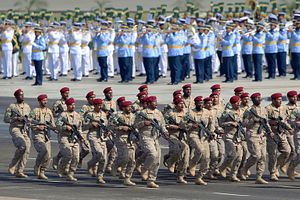Discussions about Pakistan’s foreign policy challenges typically focus on its relations with its neighbors – particularly India and Afghanistan – and with greater powers such as the United States and China. But Pakistan’s relations with the Middle East are shifting at the fastest clip with significant implications for its security and economy. The way in which Pakistan responds to the deepening regional rivalry between Saudi Arabia and Iran as well as the ongoing dispute within the Gulf Cooperation Council (GCC) will have a major impact on stability in the near term.
Pakistan’s Balancing Act
From a security perspective, Pakistan’s Middle East policy has largely focused on limiting the domestic fallout of sectarian tensions stemming from the Saudi Arabia-Iran rivalry. Pakistan is a Sunni-majority country, but Shias account for around 20 percent of the total population. The country has the second-largest Shia population in the world after Iran. It also has a history of sectarian violence comprising violent clashes and spirals of tit-for-tat assassinations between Sunni and Shia groups. More than 21,900 civilians have lost their lives in sectarian violence since 2003, according to the South Asia Terrorism Portal. Pakistan in the 1990s became the frontline in a proxy sectarian war between Saudi Arabia and Iran as the two countries offered financial and logistical support to Sunni and Shia groups, respectively, as part of a wider tussle for influence in the Muslim world.
Owing to this history, Pakistan remains wary of being drawn into power struggles along sectarian lines as they are currently playing out in the Middle East. The political and economic resurgence of Iran following the implementation of the nuclear deal in 2016, and Iran’s willingness to engage in proxy warfare in conflicts in Syria, Iraq, Lebanon, and Yemen over the past few years, has made Islamabad particularly wary of such an outcome in the foreseeable future.
Pakistan’s Middle East policy in recent years can thus be perceived as a balancing act between Saudi Arabia and Iran: it maintains an ideological affinity,a deep military and economic relationship, and strong leadership ties with the Kingdom while also forging economic and counterterrorism links with Iran. In 2015, Pakistan’s parliament voted against providing political and military support for Saudi Arabia’s military intervention in Yemen against Houthi rebels that Riyadh claimed were Iranian proxies to avoid being directly implicated in the Middle Eastern conflict. Following Saudi Arabia’s launch in December 2015 of the Islamic Military Alliance (IMA) – a 41-country alliance dubbed a “Muslim NATO” with a counterterrorism mandate – Pakistan hosted Iranian President Hassan Rouhani to reassure Tehran that the IMA is not an anti-Shia body and, in August 2016, Islamabad and Tehran agreed on joint counterterrorism efforts to tackle the militant group Islamic State (IS).
But this balancing act is becoming more precarious. In March 2017, Pakistan’s government approved the appointment of Raheel Sharif, a former army chief, as the head of the IMA. Unconfirmed reports indicate that alongside this appointment, Pakistan will contribute 7,000 troops to the alliance, in addition to the thousands – some analysts estimate the number to be as high as 70,000 – currently serving across Saudi Arabia’s armed services in a training capacity and defending its southern borders. While it remains to be seen how the IMA will operate, any counterterrorism initiatives directed against Iran would be perceived by Tehran as Pakistan choosing a side in the Middle Eastern conflict, with subsequent implications for security along the 700-kilometre Pakistan-Iran border.

































